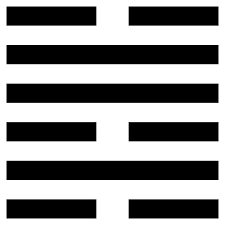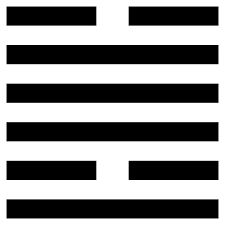
Dream Interpretation with I Ching Analysis
by Nori Muster
One way people use the I Ching with dreaming is to incubate a dream and then consult the I Ching to interpret elements of the dream. I decided to try this since I often consult the I Ching and even wrote my own version of the I Ching called Learning to Flow with the Dao. I asked my inner dream maker to reveal something about the human race and where we stand nearly a quarter of the way through the twenty-first century. Times have been difficult. We are still recovering from a worldwide pandemic and threats to our democracy; we see wars and suffering in Ukraine, the Middle East, and other regions, our climate is changing, and we have many other problems in the world. After stating my intention for a dream on these issues, over the next two days I had two relevant dreams. I'll start with the more disturbing one.
Pleasant Pride
I recorded this dream October 5, 2023, at 6:57 a.m.: "At first I'm rude to a man who is obviously either Mexican or Asian. I was rude for no reason - then I realized it was wrong of me to treat him badly so I opened a new discussion with him where I apologized for being mean. He accepted my apology and when everything was forgiven I reached out so we could shake hands."
I rarely give my dreams a title - usually just at a workshop - but I remember thinking, "that's the title, I better write it down." I'm not sure why I named the dream Pleasant Pride, but I'm glad I could remember the words from the dream and get them on paper.
When I think of pride I think of LGBT pride, black pride, women's pride, being proud of just whatever or whoever we are. I love the American dream because I like to dream the future will be better. My favorite part of the dream is equality and justice for all. Sadly, we still live in an era of inequality. I believe my dream illustrates this because I could so easily disparage a man and seem like I was rude for no reason. My association with the words Pleasant Pride suggest that in a better world we would be pleasant to others and admire them with pride. In a good future I believe we will treat others the way we want to be treated.
I often talk to people. Like, if I was stranded someplace with a few people I would probably talk to them. Same for shopping and other casual situations. A friendly word or two can break down walls and help us get to know what people around us are like. It's always a welcome surprise to meet someone who is open and friendly.
However, sometimes we might tell a joke that falls flat as a pancake, or we try to help someone and they take it the wrong way. That's what the dream Pleasant Pride was about. I didn't mean harm, but obviously harm was done. So I started up a new conversation with the man, beginning with a straight-out apology. That's what I would do or maybe had done that day and then dreamed about it.

While thinking about the theme of equality and justice for all, I consulted the I Ching and it led me to Hexagram forty-seven, Confinement. This hexagram explains that feelings of confinement are not imaginary. The metaphor is of a tree growing in a confined space where it cannot spread its branches. The first line (yin) shows someone in a "valley of uncertainty" sitting on a tree stump waiting for help and "contemplating the years that may have to pass before relief will come." Well, hundreds of years have passed in America and we still have discrimination, repression, and other manifestations of confinement.
In the fourth line (yang) the people finally arrive to help the person in the valley of uncertainty. The subject of the fourth line was on the way the whole time, but faced delays. It might have seemed like help would never arrive, but it does in this situation. When the connection takes place the subjects of these two lines form a successful alliance.
Line two (yang) explains the role of patience and gratitude. The system of confinement is systemic and difficult to overcome. What we have now was handed down to us over generations. This hexagram advises a peaceful revolution and suggests it's always a good time for people to get together to make things better. In the coming year we may see signs of this happening already because we have waited so long and so patiently.
The three remaining lines describe different types of confinement. The third line (yin) shows a prince on a rocky hillside covered with thorns. When he makes his way home he finds his wife has left him. Bad times.
The fifth line (yang) shows a privileged person who has it better than most, but this person feels confined "as if his nose and feet have been cut off." How can anyone be happy when other people are suffering?
The sixth line (yin) shows someone entangled and "bound by creepers." Over the years it can entangle us. So it's time to wake up.
Exclaim
My other dream is called "Exclaim." In the dream I saw buildings in the distance that looked like an idyllic old fashioned American town. It was misty and reminded me of little buildings that might be in a snow dome. Some of the buildings had signs on them, but the new building had a huge sign that said "Exclaim."
This is the dream as I wrote in down in my journal (October 4, 2023, at 6:35 a.m.): "Exclaim - is the sign outside a new building - things get better - even though we didn't expect it." I consulted the I Ching to understand why the word "exclaim" meant things were getting better. The I Ching responded with Hexagram Forty-nine, "Times of Change."

This hexagram describes the best and worst ways leaders can bring about change. Communication is essential because if leaders force change on the people without their understanding and support, it will result in unrest.
The first line (yang) shows someone bound in "the hide of a yellow ox." This means the person cannot take any action, but it's better to slow down so things can unfold when the time is right.
The second line (yin) shows one who finds the right time to make changes. The third line (yang) shows one who acts recklessly and causes more problems. The fourth line (yang) shows one who has learned the lessons and has acquired the ability to slow down and make good decisions.
I associate these three lines with the dream. When we exclaim it means we spontaneously shout out a word or a statement. It's a first thought, a first draft, "new" like the new building in the dream. An exclamation may pop out of our mouths unprocessed and sound anywhere from humorous to crazy. It may be too soon to share this exclamation. However, we can take our exclamation and develop it with careful consideration including feedback from people familiar with the subject. If we exclaim and it's a powerful exclamation, then we make it even more powerful as a coherent statement. Once we have the words we need to discuss the exclamation, then things can move forward. And I believe that's why "exclaim" means things are getting better.
The fifth line (yang) and sixth line (yin) offer the metaphors of tigers that change their stripes and leopards that change their spots. In the West we have sayings and proverbs that tell us a tiger can't change its stripes. In other words people may say they've changed but then go back to their old ways. However the I Ching invites us to change our stripes. I found another interpretation of Hexagram 49 to learn more about how a tiger changes its stripes. The I Ching: Mothering Change puts it like this:
"This inner re-grouping lets your real purpose shine" and "The Great Person makes a tiger transformation."
Line six says there is a way for a leopard to change its spots, and doing so without deception we cleanse ourselves from our sins and guilt. Mothering Change puts it like this:
"This inner striping leads to a breakthrough" and "The Realizing Person makes a leopard transformation."
When I think of the two dreams and the two I Ching hexagrams together I realized we have already traveled a long way down the road to equality and justice. However, to break the cycle of abuse, we will need to find the words to communicate with each other. Then we can build trust and work toward equality together.
Notes
For the author's version of the I Ching, Learning to Flow with the Dao, see https://surrealist.org.
For the alternate interpretation of Hexagram 49, see I Ching: Mothering Change https://motheringchange.com/hexagrams/h49/
This essay originally appeared in DreamTime magazine Winter 2024.
About the author
Nori Muster is a writer-researcher based in Arizona. She has kept a dream journal since 1979 and digitized it (typed it) from 2018-2021 to study it for statistics. Her website for dreams studies is surrealist.org/dreams and her dream journals are held in the American Religions Collection (ARC) at the University of California, Santa Barbara, Special Research Collections Research Library and Online Archive of California (OAC).
Index